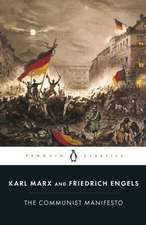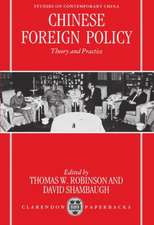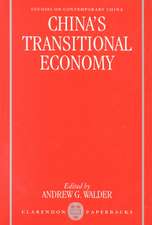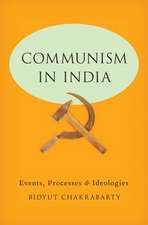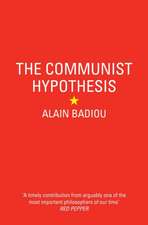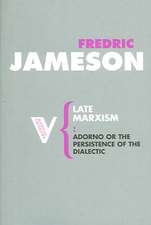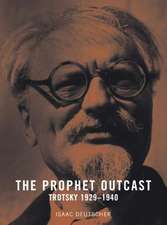Agents of Moscow: The Hungarian Communist Party and the Origins of Socialist Patriotism 1941-1953: Oxford Historical Monographs
Autor Martin Meviusen Limba Engleză Hardback – 13 ian 2005
Din seria Oxford Historical Monographs
- 19%
 Preț: 497.26 lei
Preț: 497.26 lei - 12%
 Preț: 310.34 lei
Preț: 310.34 lei - 30%
 Preț: 539.99 lei
Preț: 539.99 lei - 15%
 Preț: 244.01 lei
Preț: 244.01 lei - 13%
 Preț: 532.53 lei
Preț: 532.53 lei - 30%
 Preț: 499.46 lei
Preț: 499.46 lei - 30%
 Preț: 497.67 lei
Preț: 497.67 lei - 30%
 Preț: 499.46 lei
Preț: 499.46 lei - 30%
 Preț: 498.68 lei
Preț: 498.68 lei - 30%
 Preț: 604.98 lei
Preț: 604.98 lei - 30%
 Preț: 497.63 lei
Preț: 497.63 lei - 24%
 Preț: 496.31 lei
Preț: 496.31 lei - 30%
 Preț: 498.68 lei
Preț: 498.68 lei - 22%
 Preț: 497.81 lei
Preț: 497.81 lei - 25%
 Preț: 556.27 lei
Preț: 556.27 lei - 14%
 Preț: 539.57 lei
Preț: 539.57 lei - 30%
 Preț: 500.29 lei
Preț: 500.29 lei - 13%
 Preț: 533.57 lei
Preț: 533.57 lei - 25%
 Preț: 569.72 lei
Preț: 569.72 lei - 30%
 Preț: 610.82 lei
Preț: 610.82 lei - 34%
 Preț: 1153.34 lei
Preț: 1153.34 lei - 51%
 Preț: 614.88 lei
Preț: 614.88 lei - 34%
 Preț: 1195.31 lei
Preț: 1195.31 lei - 34%
 Preț: 1035.84 lei
Preț: 1035.84 lei - 34%
 Preț: 1006.40 lei
Preț: 1006.40 lei - 29%
 Preț: 864.39 lei
Preț: 864.39 lei - 34%
 Preț: 1160.09 lei
Preț: 1160.09 lei - 34%
 Preț: 1432.67 lei
Preț: 1432.67 lei - 31%
 Preț: 328.46 lei
Preț: 328.46 lei - 34%
 Preț: 574.40 lei
Preț: 574.40 lei - 34%
 Preț: 1067.93 lei
Preț: 1067.93 lei - 34%
 Preț: 1004.67 lei
Preț: 1004.67 lei - 31%
 Preț: 331.22 lei
Preț: 331.22 lei - 34%
 Preț: 1153.28 lei
Preț: 1153.28 lei - 34%
 Preț: 1254.66 lei
Preț: 1254.66 lei - 34%
 Preț: 946.79 lei
Preț: 946.79 lei - 34%
 Preț: 962.63 lei
Preț: 962.63 lei - 34%
 Preț: 1126.38 lei
Preț: 1126.38 lei - 31%
 Preț: 469.27 lei
Preț: 469.27 lei - 23%
 Preț: 332.04 lei
Preț: 332.04 lei - 28%
 Preț: 375.23 lei
Preț: 375.23 lei - 34%
 Preț: 1049.14 lei
Preț: 1049.14 lei - 34%
 Preț: 1036.73 lei
Preț: 1036.73 lei - 51%
 Preț: 757.67 lei
Preț: 757.67 lei - 34%
 Preț: 1082.61 lei
Preț: 1082.61 lei - 34%
 Preț: 1155.39 lei
Preț: 1155.39 lei - 31%
 Preț: 328.53 lei
Preț: 328.53 lei - 34%
 Preț: 1110.12 lei
Preț: 1110.12 lei - 31%
 Preț: 487.75 lei
Preț: 487.75 lei - 34%
 Preț: 1153.41 lei
Preț: 1153.41 lei
Preț: 1198.12 lei
Preț vechi: 1823.35 lei
-34% Nou
Puncte Express: 1797
Preț estimativ în valută:
229.25€ • 239.38$ • 189.31£
229.25€ • 239.38$ • 189.31£
Carte tipărită la comandă
Livrare economică 04-10 aprilie
Preluare comenzi: 021 569.72.76
Specificații
ISBN-13: 9780199274611
ISBN-10: 0199274614
Pagini: 312
Ilustrații: 6 halftones
Dimensiuni: 146 x 224 x 22 mm
Greutate: 0.55 kg
Editura: OUP OXFORD
Colecția OUP Oxford
Seria Oxford Historical Monographs
Locul publicării:Oxford, United Kingdom
ISBN-10: 0199274614
Pagini: 312
Ilustrații: 6 halftones
Dimensiuni: 146 x 224 x 22 mm
Greutate: 0.55 kg
Editura: OUP OXFORD
Colecția OUP Oxford
Seria Oxford Historical Monographs
Locul publicării:Oxford, United Kingdom
Recenzii
There is thorough documentary evidence and the skillful analytical assessment is overwhelming.
...succeeds in explaining the radical nationalism of Hungarian propaganda in international perspective, as a result of the Stalinization of both the USSR and the Hungarian communists. In this broad perspective lies the strength of his work.
Martin Mevius successfully demonstrates how the Hungarian Communists sought, and failed, to appropriate national symbols and Magyar heroes in his excellent Agents of Moscow
Agents of Moscow is a worthy contribution to the growing scholarship on nationalism under Communism. An extremely well-researched monograph...
It is difficult to overstate the contribution made by Martin Mevius to the understanding of the frequently complex and evidently contradictory relationship between Soviet objectives and those of the communist party.... This is an original, bold and ultimately fascinating book.
... written in a flowing, very comprehensible style... Mevius introduces truly interesting sources... The book's strength is that it places MKP policy in an international perspective, and discredits the widely held view... that the Hungarian communists were merely mindless instruments of Moscow.
..a gripping and highly readable book..
Mevius' work stands out because of its clear language, the systematic and easy to follow structure of the argument, and its proximity to the sources from various party archives.
Agents of Moscow is a worthy contribution to the growing number of studies on nationalism under communism... An extremely well-researched monograph, it will surely enhance both graduate and undergraduate courses on Soviet and East European history and politics.
Mevius has written an excellent account which highlights Stalin's pragmatic order to East-European communists to present themselves as patriots and the contorted, unsuccessful efforts which were the result. It is a pioneering book.
An important contribution to the understanding of the late Stalin period in the history of Communism.
Mevius's discussion of communist nationalism deepens our understanding of Soviet aims and communist tactics after 1945.
...a very detailed, and intriguing, exploration of how a nationalist policy is constructed, contested and implemented by a political movement...this would be an excellent work for either undergraduate or postgraduate teaching. Rich in detail and stimulating analysis, this book is highly recommended.
Martin Mevius, drawing on evidence from Hungary, convincingly shows us why a Communist politics of nationality was central to the creation and consolidation of socialist regimes This is a path-breaking study in a number of important respects.
This is an important study based upon extensive research. Summing Up: Highly recommended.
...succeeds in explaining the radical nationalism of Hungarian propaganda in international perspective, as a result of the Stalinization of both the USSR and the Hungarian communists. In this broad perspective lies the strength of his work.
Martin Mevius successfully demonstrates how the Hungarian Communists sought, and failed, to appropriate national symbols and Magyar heroes in his excellent Agents of Moscow
Agents of Moscow is a worthy contribution to the growing scholarship on nationalism under Communism. An extremely well-researched monograph...
It is difficult to overstate the contribution made by Martin Mevius to the understanding of the frequently complex and evidently contradictory relationship between Soviet objectives and those of the communist party.... This is an original, bold and ultimately fascinating book.
... written in a flowing, very comprehensible style... Mevius introduces truly interesting sources... The book's strength is that it places MKP policy in an international perspective, and discredits the widely held view... that the Hungarian communists were merely mindless instruments of Moscow.
..a gripping and highly readable book..
Mevius' work stands out because of its clear language, the systematic and easy to follow structure of the argument, and its proximity to the sources from various party archives.
Agents of Moscow is a worthy contribution to the growing number of studies on nationalism under communism... An extremely well-researched monograph, it will surely enhance both graduate and undergraduate courses on Soviet and East European history and politics.
Mevius has written an excellent account which highlights Stalin's pragmatic order to East-European communists to present themselves as patriots and the contorted, unsuccessful efforts which were the result. It is a pioneering book.
An important contribution to the understanding of the late Stalin period in the history of Communism.
Mevius's discussion of communist nationalism deepens our understanding of Soviet aims and communist tactics after 1945.
...a very detailed, and intriguing, exploration of how a nationalist policy is constructed, contested and implemented by a political movement...this would be an excellent work for either undergraduate or postgraduate teaching. Rich in detail and stimulating analysis, this book is highly recommended.
Martin Mevius, drawing on evidence from Hungary, convincingly shows us why a Communist politics of nationality was central to the creation and consolidation of socialist regimes This is a path-breaking study in a number of important respects.
This is an important study based upon extensive research. Summing Up: Highly recommended.

